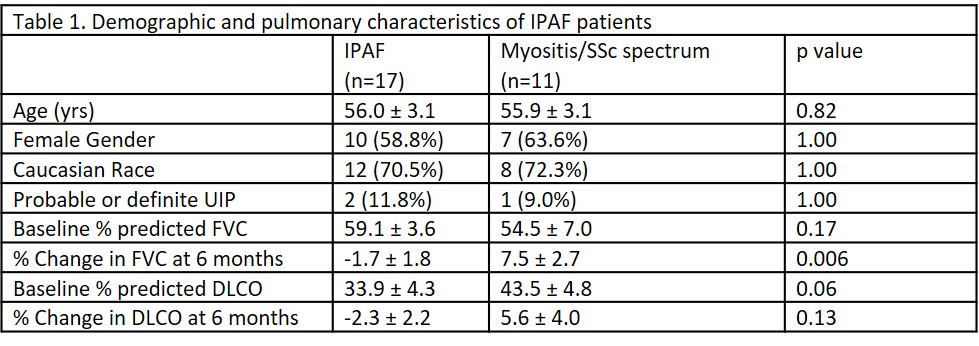Session Information
Date: Sunday, November 8, 2020
Session Type: Poster Session C
Session Time: 9:00AM-11:00AM
Background/Purpose: Classification criteria for interstitial pneumonia with autoimmune features (IPAF) were introduced in 2015 to identify interstitial lung disease (ILD) patients who might benefit from immunosuppression but do not meet classification criteria for a defined connective tissue disease. While many descriptions of IPAF have focused on radiographic and histologic distinctions (e.g. usual interstitial pneumonia v. non-specific interstitial pneumonia), fewer investigations probed whether various autoantibodies correlate with immunosuppression response. We hypothesized that IPAF patients with myositis and systemic sclerosis associated antibodies would have a greater improvement in % predicted forced vital capacity (FVC) and diffusing capacity of the lungs for carbon monoxide (DLCO) compared to other IPAF patients.
Methods: Patients meeting classification criteria for IPAF were enrolled in the longitudinal VUMC Myositis and Scleroderma Treatment Initiative Center Cohort (VUMC IRB 141415). Patients were enrolled from 9/17/2017-3/30/2019). Inclusion criteria included treatment with immunosuppression (e.g. azathioprine, mycophenolate mofetil, or rituximab), complete serologies (RF, CCP, immunofluorescent ANA, and extended myositis panel), and at least 6 months of physiologic follow-up data. Patients with an anti-synthetase antibody, Scl70, Pm/Scl70, or MDA5 antibody were classified as myositis/systemic sclerosis spectrum.
Results: Twenty-eight patients were identified from the MYSTIC cohort who met inclusion criteria. Demographics and pulmonary radiographic and physiologic features are shown in Table 1. There was no difference in age, female gender, or Caucasian race between IPAF and myositis/SSc spectrum patients. There was no difference in the severity of restriction between the groups at baseline, but myositis/SSc spectrum patients had a greater improvement in the % predicted FVC (7.5 ± 2.7% v. -1.7 ± 1.8%, p=0.006) after immunosuppression. At baseline, IPAF patients trended towards a worse % predicted DLCO than myositis SSc spectrum patients at baseline (33.9 ± 4.3 v. 43.5 ± 4.8 %, p=0.06). Myositis/SSc patients also trended towards greater improvement in the % predicted DLCO after immunosuppression (5.6 ± 4.0% v. -2.3 ± 2.2, p=0.13).
Conclusion: In this single-center prospective longitudinal study, patients with myositis and SSc specific antibodies derived benefit from immunosuppression and should be immunosuppressed even if they do not meet classification criteria. These findings further highlight the importance of comprehensive serologies in the initial evaluation of ILD.
To cite this abstract in AMA style:
Wilfong E, Schroeder G, Barnado A, Lord S, Annapureddy N, Dudenhofer R, Crofford L. Myositis and Systemic Sclerosis Spectrum IPAF Patients Are More Likely to Respond Favorably to Immunosuppression [abstract]. Arthritis Rheumatol. 2020; 72 (suppl 10). https://acrabstracts.org/abstract/myositis-and-systemic-sclerosis-spectrum-ipaf-patients-are-more-likely-to-respond-favorably-to-immunosuppression/. Accessed .« Back to ACR Convergence 2020
ACR Meeting Abstracts - https://acrabstracts.org/abstract/myositis-and-systemic-sclerosis-spectrum-ipaf-patients-are-more-likely-to-respond-favorably-to-immunosuppression/

